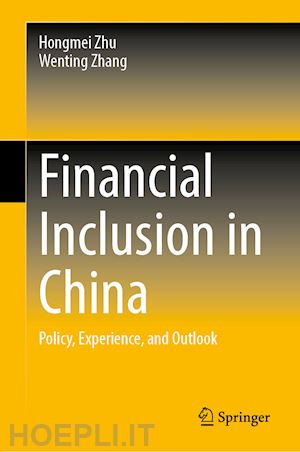
Questo prodotto usufruisce delle SPEDIZIONI GRATIS
selezionando l'opzione Corriere Veloce in fase di ordine.
Pagabile anche con Carta della cultura giovani e del merito, 18App Bonus Cultura e Carta del Docente
This book aims to provide first-hand information for readers who are concerned about inclusive finance and sustainable development by summarizing China’s policy measures and practical innovations in the development of inclusive finance and expects to provide China’s experience for the development of inclusive finance in more regions. From a worldwide perspective, a large number of people had been excluded from formal financial services for a long time due to various factors. Even in developed economies with sound financial systems, relatively disadvantaged groups are often denied access to effective financial services. In 2005, the United Nations proposed the concept of Inclusive Finance, emphasizing the extension of financial services to less developed regions and low-income groups in society at an affordable cost by improving financial infrastructure and providing them with reasonably priced and convenient financial services. In 2015, the United Nations adopted the 2030 Agenda forSustainable Development, making inclusive finance an important focus for achieving sustainable development. It has become a global consensus to vigorously develop inclusive finance.
China has attached importance to improving financial services for disadvantaged groups such as rural residents, micro-, small and medium enterprises (MSMEs) and others. In 2013, Developing “Inclusive Finance” became China’s national strategy. In 2015, China formulated the Plan for Promoting the Development of Inclusive Finance (2016-2020). In 2016, during its presidency of the Global Partnership for Financial Inclusion (GPFI), China proposed the issue of "Digital Financial Inclusion" and issued the G20 High-level Principles for Digital Financial Inclusion at the G20 Hangzhou Summit in the same year. Through policy guidance and active practice by the financial sector, China has gradually formed a unique development model of inclusive finance and achieved remarkable successes. Physical outlets, service machines and online service channels have been improved, and basic financial services have generally covered both urban and rural areas. The financial services for rural households and MSMEs have improved significantly. The efficiency and convenience of financial services have been significantly improved, and the satisfaction of financial services has significantly increased. China's experience in inclusive finance has been recognized by the international community. In 2017, five cases from China were selected in the G20 report on Digital Financial Inclusion: Emerging Policy Approaches.
Chapter 1. Introduction.- Chapter 2. History of Inclusive Finance Development in China.- Chapter 3. China's Financial Inclusion Policy Framework.- Chapter 4. Organization System of Inclusive Finance in China.- Chapter 5. Infrastructure of Inclusive Finance in China.- Chapter 6. Innovation and Practices of Inclusive Finance in China .- Chapter 7. China's Inclusive Finance Development Achievements.- Chapter 8. Prospects of Inclusive Finance Development in China.
Zhu Hongmei is a professor of Economics at Beijing Academy of Social Sciences(Bass). Before joining the Bass in (October)2022, she worked at the Research Institute of the People's Bank of China for more than 10 years as Director-General and Senior Fellow. She has long been engaged in the research and formulation of rural finance and inclusive finance policies. As the director, she has organized the publication book series of "China Rural Finance Service Report. She has published more than 20 papers in academic journals.
Zhang Wenting did his Ph.D. in Accounting and Finance of Durham University (UK) with the Best Doctoral Thesis Award. She is currently Senior Research Fellow of the Research Institute of the People's Bank of China. She is mainly engaged in the research of International Finance, Inclusive Finance, FinTech, Climate Finance, and the relative policy suggestions. She has compiled many books, such as “Bank Credit Operation Management”, “China Community Bank Management”, “Artificial Financial Intelligence in China” and the translation of Paul Volcker's autobiography “Keeping at It”, “Why Not Default” and other works. She participated in many domestic and international academic conferences and published dozens of academic papers or articles on top domestic and international journals, such as the International Review of Financial Analysis and China Finance.











Il sito utilizza cookie ed altri strumenti di tracciamento che raccolgono informazioni dal dispositivo dell’utente. Oltre ai cookie tecnici ed analitici aggregati, strettamente necessari per il funzionamento di questo sito web, previo consenso dell’utente possono essere installati cookie di profilazione e marketing e cookie dei social media. Cliccando su “Accetto tutti i cookie” saranno attivate tutte le categorie di cookie. Per accettare solo deterninate categorie di cookie, cliccare invece su “Impostazioni cookie”. Chiudendo il banner o continuando a navigare saranno installati solo cookie tecnici. Per maggiori dettagli, consultare la Cookie Policy.